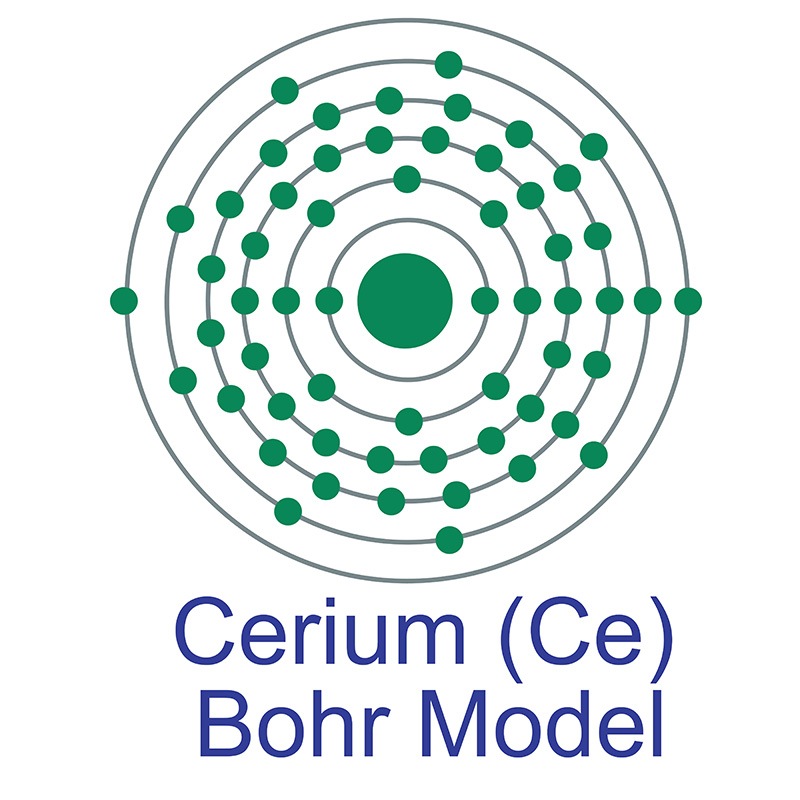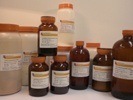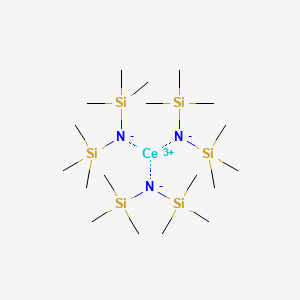See more Cerium products. Cerium (atomic symbol: Ce, atomic number: 58) is a Block F, Group 3, Period 6 element with an atomic weight of 140.116. The number of electrons in each of cerium's shells is 2, 8, 18, 19, 9, 2 and its electron configuration is [Xe]4f2 6s2.  The cerium atom has a radius of 182.5 pm and a Van der Waals radius of 235 pm. In its elemental form, cerium has a silvery white appearance. Cerium is the most abundant of the rare earth metals. It is characterized chemically by having two valence states, the +3 cerous and +4 ceric states. The ceric state is the only non-trivalent rare earth ion stable in aqueous solutions.
The cerium atom has a radius of 182.5 pm and a Van der Waals radius of 235 pm. In its elemental form, cerium has a silvery white appearance. Cerium is the most abundant of the rare earth metals. It is characterized chemically by having two valence states, the +3 cerous and +4 ceric states. The ceric state is the only non-trivalent rare earth ion stable in aqueous solutions.  It is therefore strongly acidic and oxidizing, in addition to being moderately toxic.The cerous state closely resembles the other trivalent rare earths. Cerium is found in the minerals allanite, bastnasite, hydroxylbastnasite, monazite, rhabdophane, synchysite and zircon. Cerium was discovered by Martin Heinrich Klaproth, Jöns Jakob Berzelius, and Wilhelm Hisinger in 1803 and first isolated by Carl Gustaf Mosander in 1839. The element was named after the asteroid Ceres, which itself was named after the Roman god of agriculture.
It is therefore strongly acidic and oxidizing, in addition to being moderately toxic.The cerous state closely resembles the other trivalent rare earths. Cerium is found in the minerals allanite, bastnasite, hydroxylbastnasite, monazite, rhabdophane, synchysite and zircon. Cerium was discovered by Martin Heinrich Klaproth, Jöns Jakob Berzelius, and Wilhelm Hisinger in 1803 and first isolated by Carl Gustaf Mosander in 1839. The element was named after the asteroid Ceres, which itself was named after the Roman god of agriculture.
Materials
Materials by Form
2D Materials Alloy & Alloy Forms Pure Metals & Metal FormsCeramic FibersFoams: Metallic & Ceramic High Purity Materials Isotopes MXenesOxides Rare Earths Semiconductors Solutions
Chemicals & Salts
All Chemicals & Salts Acetates Aluminides Ammonium Sulfates Antimonides Arsenates Benzoate Bromates Bromides Carbonates Chlorides Chromates Fluorides Hydrides Hydroxides Iodates Iodides Lactates Molybdates Nitrates Oxalates Oxides Perchlorates Phosphates Selenates Selenides Selenites Silicates Stearates Sulfates Sulfides Sulfites Tantalates Tellurates Tellurides Tellurites ThiocyanatesVanadates
Ceramics
Nanomaterials
Organometallics
Materials by Application
Additive Manufacturing & 3D Printing Battery & Supercapacitor Materials Catalysts Dental Materials Electronics Materials Fuel Cell Materials Fusion EnergyGlass Manufacturing Green Technology & Alternative Energy Hydrogen Storage Laser Crystals Life Sciences & Biomaterials Metallurgy Nanotechnology & Nanomaterials Optical Materials Photovoltaic & Solar Energy Plating Pigments & Coatings Research & Development Space Technology Sputtering Targets Thin Film Deposition Water Treatment Weather Modification
Life Science Chemicals
Life Science Products AlcoholsAldehydesAmidesAminesAmino Acids & DerivativesAromaticsArylsAzetidinesBenzimidazolesBenzisoxazolesBenzodioxansBenzofuransBenzothiazolesBenzothiophenesBenzoxazolesCarboxylic AcidsEnzymes & InhibitorsEstersEthersFluorinated Building BlocksFuransHalidesImidazolesImidazolidinesIndazolesIndolesIndolinesIsoquinolinesIsoxazolesKetonesMorpholinesNaphthyridinesNitrilesOrganoboronOrganosiliconOxadiazolesOxazolesPharmaceuticals & IntermediatesPhenolsPhytochemicalsPiperazinesPiperidinesPyrazinesPyrazolesPyridazinesPyridinesPyrimidinesPyrrolesPyrrolidinesPyrrolinesQuinazolinesQuinolinesQuinoxalinesSpiroesSulfonyl ChloridesTetrahydroisoquinolinesTetrahydropyransTetrahydroquinolinesTetrazolesThiadiazolesThiazolesThiazolidinesThiolsThiophenesTriazinesTriazoles
About Us
Locations
Austria Belgium Brazil Canada China & Hong Kong Czech Republic Denmark Finland France Germany Greece Hungary India Indonesia Israel Italy Japan Malaysia Mexico Netherlands Norway Philippines Poland Portugal Russia Singapore South Korea Spain Sweden Switzerland Taiwan Thailand Turkey United Kingdom United States
Industries
Aerospace Agriculture Automotive Chemical Manufacturing Defense Dentistry Electronics Energy Storage & Batteries Fine Art Materials Fuel CellsFusion Energy Glass Investment Grade Metals Jewelry & Fashion Lasers Lighting Medical Devices Museums & Galleries Nuclear Energy Oil & Gas Optics Paper & Pulp Pharmaceuticals & Cosmetics Research & Laboratory Robotics Solar Energy Space Sports Equipment Steel & Alloy Producers Textiles & Fabrics Water Treatment Municipalities
Follow Us
 organo-inorganic and metallo-organic compounds) sold by American Elements under the trade name
organo-inorganic and metallo-organic compounds) sold by American Elements under the trade name
